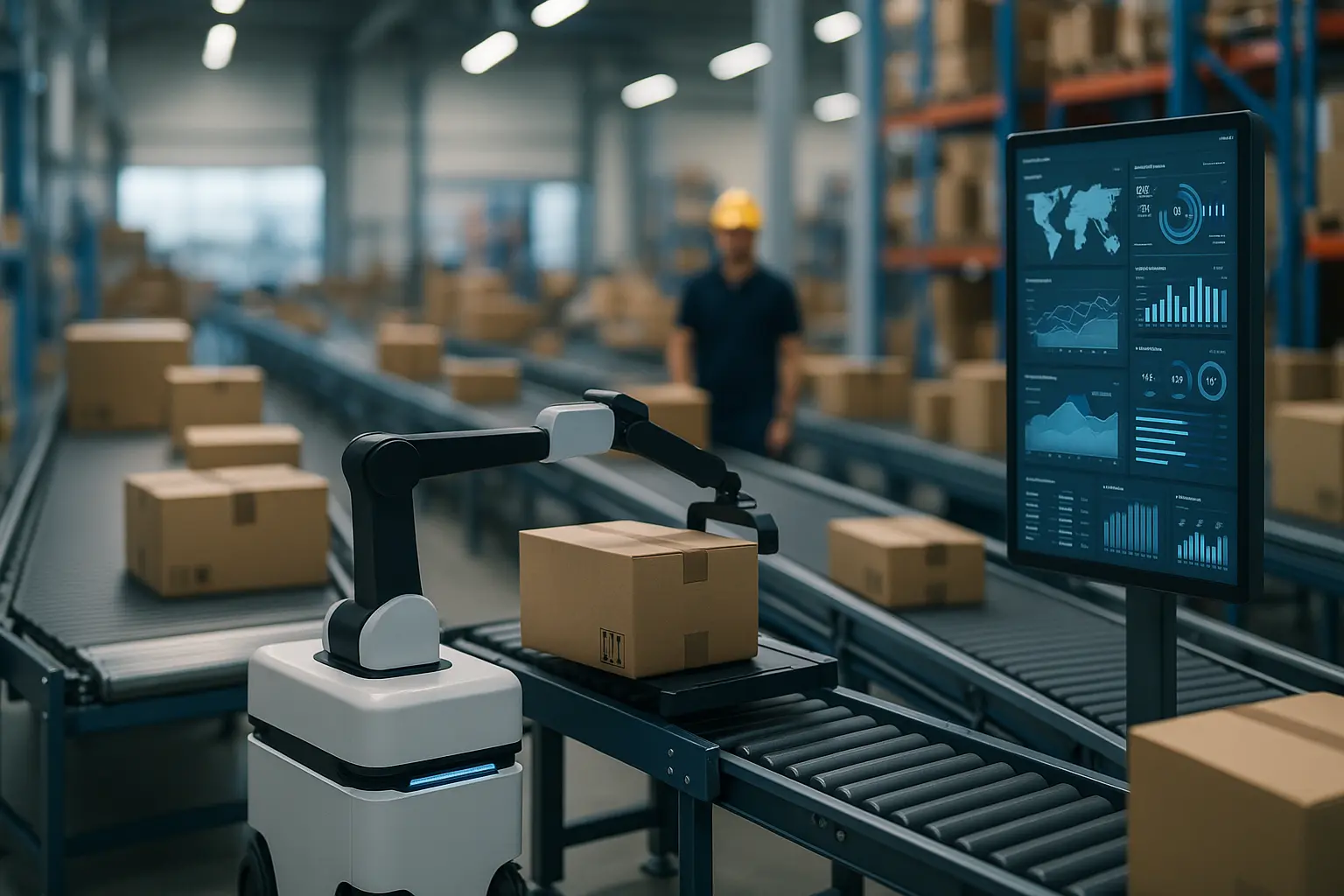In the bustling realm of modern business, logistics stands as the backbone, orchestrating the flow of goods from point A to point B. Yet, as we advance through the digital age, the traditional logistics systems are rapidly evolving into “Smart Logistics.” This transformation is catalyzed by technologies like the Internet of Things (IoT), big data, and advanced supply chain management systems. But what exactly makes logistics “smart”? And how do these advancements promise to reshape the industry? Join us as we delve into the dynamic world of smart logistics, unpacking its components and the profound impact it has on businesses today.
The Heart of Smart Logistics: IoT and Data
Imagine a world where every shipment can be tracked in real-time, where each aspect of the supply chain is interconnected, forming a system that seamlessly manages itself. At the heart of smart logistics lie technologies like the Internet of Things (IoT) and big data analytics. These tools transform raw data into actionable insights, enabling businesses to enhance their operations and tackle challenges with unmatched precision.
Understanding IoT: The IoT refers to a network of physical devices embedded with sensors and software designed to collect and exchange data. In logistics, IoT devices can be attached to shipments, vehicles, and storage facilities, providing real-time updates on their status and condition. This connectivity allows for a transparent supply chain, where potential issues can be identified and resolved swiftly, minimizing delays.
Harnessing Big Data: The raw data gathered through IoT sensors is vast and varied. This is where big data analytics comes into play, analyzing the information to extract patterns and trends. For instance, by predicting peak times for delivery or identifying bottlenecks in the supply chain, businesses can make informed decisions that optimize time and resources.
The Result: The integration of IoT and data analytics in logistics systems creates a more fluid and responsive supply chain, significantly enhancing efficiency and reducing costs. By adopting these technologies, businesses are better equipped to meet the increasing demands of the modern consumer, ensuring goods are delivered on time and in perfect condition.
Smart Transportation: The Backbone of Efficient Delivery
Transportation remains a pivotal element in the logistics equation, and smart logistics revolutionizes this component through innovative technologies. From autonomous vehicles to drone deliveries, the landscape of transportation is undergoing a significant transformation.
Autonomous Vehicles: Self-driving trucks and delivery vehicles are at the forefront of modern logistics advancements. By utilizing a combination of sensors, cameras, and AI technologies, these vehicles navigate roads with precision, reducing the reliance on human drivers and minimizing the risk of accidents. As a result, businesses experience faster and more reliable deliveries.
Drone Deliveries: Drones are no longer a futuristic concept but an integral part of smart logistics. These agile flying devices can bypass traffic congestion and swiftly deliver parcels, particularly in urban areas. By expanding delivery reach, drones enhance customer satisfaction and pave the way for innovative last-mile delivery solutions.
The Role of Real-time Data: Smart transportation isn’t just about new gadgets; it’s also about utilizing real-time data to optimize routes, manage fleets, and ensure vehicles operate at peak efficiency. By leveraging data-driven insights, companies can reduce fuel consumption, decrease maintenance costs, and improve overall time management.
Impact on Businesses: The adoption of smart transportation solutions translates to a competitive edge for businesses. By embracing these technologies, companies can offer faster, more reliable services, gaining the trust of their customers and establishing a strong market presence.
Revolutionizing Supply Chain Management: A New Era of Efficiency
In the realm of supply chain management, efficiency is key. Smart logistics introduces transformative tools and strategies that redefine how businesses approach this critical process.
Blockchain Technology: At the forefront of this revolution is blockchain, a technology that enhances transparency and traceability in the supply chain. By recording every transaction securely and immutably, blockchain reduces fraud, ensures product authenticity, and simplifies audits.
Predictive Analytics: Another significant advancement is predictive analytics, which forecasts demand and optimizes inventory management. By analyzing historical data, businesses can anticipate customer needs, reducing overstock and stockouts, and ensuring that goods are available when and where they are needed.
Collaborative Platforms: Smart supply chains also emphasize collaboration. Platforms that enable real-time communication between suppliers, manufacturers, and retailers are integral in creating a synchronized and agile supply chain that responds swiftly to market changes.
The Benefits: These advancements culminate in an efficient, responsive supply chain that minimizes waste and maximizes productivity. For businesses, this translates to reduced costs, improved margins, and a stronger ability to adapt to changing market demands, ensuring a competitive advantage.
As we navigate the complexities of the 21st-century market, the importance of integrating smart logistics into business operations becomes increasingly clear. By leveraging cutting-edge technologies such as IoT, predictive analytics, and blockchain, businesses can revolutionize their supply chains, transportation, and delivery systems, offering unprecedented efficiency and reliability.
The transformation to smart logistics is not merely an upgrade—it’s a necessity for businesses aiming to thrive in today’s fast-paced world. By embracing these innovations, companies are not only optimizing their operations but also carving out a path toward a sustainable and prosperous future.
In the age of globalization and instant gratification, smart logistics positions businesses at the forefront of industry advancements, propelling them into a new era of success. As you embark on this journey, remember that the key to thriving is adaptability—embrace the change, and let smart logistics be your guide to a brighter tomorrow.
FAQ
What exactly is smart logistics?
Smart logistics refers to the use of advanced technologies to enhance the efficiency, accuracy, and speed of logistics and supply chain operations. This approach leverages data analytics, IoT, AI, and automation to streamline processes, reduce costs, and improve service delivery.
How do smart logistics systems work?
Smart logistics systems integrate various technologies to create a connected network that facilitates real-time data sharing and decision-making. For instance, sensors on vehicles and packages provide tracking information, while AI algorithms optimize routing and scheduling. This interconnectedness ensures seamless operations across the supply chain.
What are the main benefits of adopting smart logistics?
The primary advantages include increased operational efficiency, cost savings, improved customer satisfaction, and enhanced transparency. Businesses can anticipate demands more accurately, reduce waste, and quickly respond to disruptions, ensuring a smoother flow of goods and services.
Can small businesses also benefit from smart logistics solutions?
Absolutely! While initially more prevalent in large enterprises, smart logistics solutions are now increasingly accessible to small and medium-sized businesses. Affordable cloud-based platforms and scalable technologies allow smaller companies to enjoy the benefits of optimized logistics without significant upfront investments.
What challenges might businesses face when implementing smart logistics?
Some challenges include the initial cost of technology adoption, the need for staff training, data security concerns, and the complexity of integrating new systems with existing infrastructure. However, the long-term benefits often outweigh these initial hurdles, making smart logistics a valuable investment.



